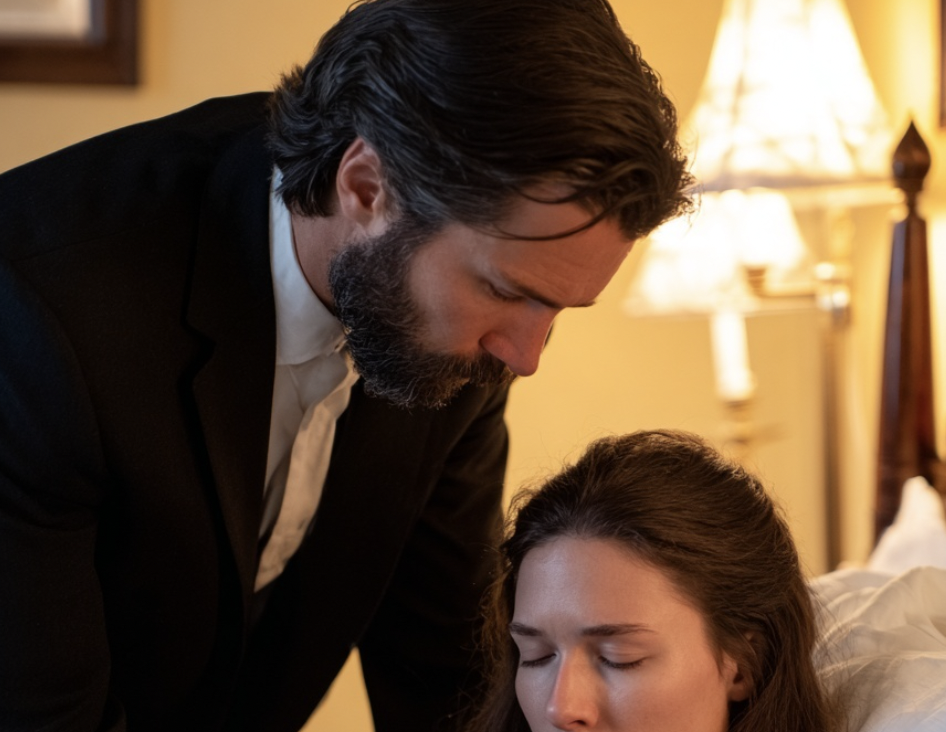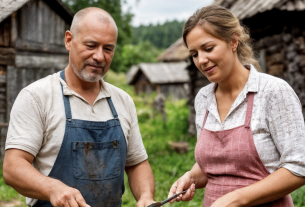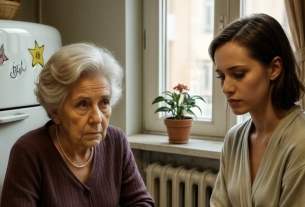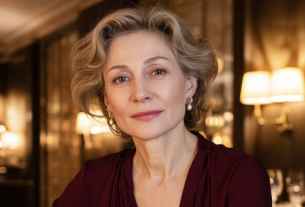Elena slowly wiped the fogged-up mirror in the bathroom and froze, staring intently at her reflection. Her once-soft facial features now seemed sharp and angular, her cheeks noticeably hollowed, and her eyes had lost their former sparkle, becoming dull and lifeless. The illness was mercilessly altering her appearance, as if erasing all traces of her former life. I need to call Katya, she repeated to herself. Her niece had to know the truth, even if it would be hard for them both.
From the living room came the muffled sound of a soccer match—Pavel was once again sprawled on the couch, legs up on the coffee table, engrossed in the game. No doubt, crumbs from his beloved TV chips were already scattered around him. Elena sighed heavily, feeling the invisible weight pressing on her shoulders, and closed her eyes, trying to detach from reality, if only for a moment.
This apartment was the symbol of her years of effort and sacrifice. She had bought it long before she met Pavel, paying off the mortgage over five long years. She worked two jobs, denied herself the bare minimum, saved on everything: ate the simplest food, avoided buying anything for her own pleasure, came home well after midnight only to leave for work again at sunrise. When she finally made the last payment, she couldn’t hold back her tears—these walls were steeped in her sleepless nights, endless labor, and sheer persistence. She knew she had earned them at the cost of her life, and this apartment was more than just a home—it was proof of her resilience.
She met Pavel by chance a few years ago, in a coffee shop line. He had won her over with his attention, easygoing manner, and caring attitude. During the first month of their relationship, he showered her with flowers, cooked romantic dinners, and showed touching concern. But then, everything changed abruptly, as if someone had switched off the light. The perfect man she thought she’d found slowly vanished, replaced by someone who no longer cared about her life—or her feelings.
“Lena, did you pay for the internet? It’s acting up today,” Pavel called from the living room.
“Yes, I paid on Monday,” she replied, stepping out of the bathroom. “Restart the router.”
“Too far,” he drawled lazily. “Come on, you’re closer.”
Elena didn’t argue. She silently went over to the router, blinking red, and pressed the reset button. Such little everyday irritations had long since stopped bothering her. But today, after her visit to the doctor, every detail of their shared life seemed to take on a sharper, more significant meaning.
“Stage four,” the doctor had said, avoiding her gaze. “Metastases in the liver and bones. There are treatment options, but we have to be realistic.”
Elena nodded, as if he were telling her tomorrow’s weather rather than how much time she had left. She had always been practical, and the diagnosis only reinforced her habit of solving problems step by step. In her mind, she began making a list: write a will, check the insurance, talk to Katya. Everything had to be arranged so that nothing was left to chance.
“Lena, what’s for dinner?” Pavel’s voice again.
“I didn’t cook today,” she said, sitting down in the armchair. “Order something.”
“Spend money again? You had the day off—you could’ve cooked,” he grumbled.
Elena didn’t reply. Pavel truly believed that earning money was a woman’s job. He preferred odd gigs or daydreaming about grand projects that never materialized. At first, Elena hadn’t minded—she was used to relying only on herself. But over time, it became clear: Pavel wasn’t just lazy; he genuinely believed his role was to “find himself” while she kept them afloat.
“I went to the doctor today,” Elena said, looking at his profile.
“Mm-hmm,” he murmured without looking away from the TV.
“I have cancer.”
Pavel turned to her, frowning in confusion.
“What?”
“Cancer, Pasha. Stage four,” she repeated calmly.
He set the remote aside and sat up straighter, visibly shaken.
“What does stage four mean? Can’t they treat it?”
“They can try, but chances are slim. The doctor says it’s a matter of months.”
Pavel blinked, ran a hand through his hair.
“Well… medicine’s advanced these days. Maybe there are experimental treatments? Or abroad?”
“Maybe. But it’s expensive,” Elena said, watching his face.
“You have good insurance, don’t you? And savings,” he said quickly.
There it was. Even now, his first thought was money—not how to support her, but how to handle the problem financially. And naturally, she was to bear the responsibility for her own treatment.
“Yes, I have savings,” Elena said.
“Then great,” he replied with forced optimism. “We’ll treat it. You’ll see, everything will be fine.”
He gave her a quick, awkward hug, then stepped back as if afraid of catching something.
“I need to meet with Dimon about some work stuff,” he said, grabbing his jacket. “Hang in there, okay? I won’t be long.”
The door closed before Elena could respond.
A week later, it was obvious: Pavel was coming home late, claiming to have work meetings despite working from home for the past two years. He smelled of unfamiliar perfume and kept his phone face-down. Elena didn’t confront him. What was the point? After the doctor’s words, such things no longer mattered—until one night, she overheard him on the balcony:
“Yeah, it’ll be over soon,” he said to someone. “The doctor says she won’t last long. Of course I’m upset, but… Well, the inheritance will be mine. We’re married—apartment, savings… all mine.”
Elena froze. So that was it—he was already planning his life without her, counting on what she had earned through years of sacrifice.
The next morning, Pavel cheerfully announced he was going to a friend’s dacha “to clear his head.” Elena only nodded. As soon as the door shut, she called Katya.
“Come over. We need to talk.”
Within an hour, Katya arrived, worried. When Elena told her the diagnosis, she cried but quickly composed herself.
“What can I do?”
“Help me make a will. I want the apartment and all my savings to go to you.”
“But… Uncle Pasha?”
“Katya, he’s already planning how to spend my money,” Elena said with a bitter smile. “While I’m under IV drips, he’s busy with his new fling.”
That same day, they went to a notary. Elena also filed for divorce—no property disputes, no drama, just ending what had long been a hollow arrangement.
For the first time in years, she felt lighter.
When Pavel returned three days later, rested and smelling of cologne, a message from the government portal informed him of the divorce filing. He thought it was a mistake. When he saw the details, panic set in—especially the note stating the property wasn’t subject to division. Half her belongings were gone; so was her presence.
When Elena came back briefly to collect the rest, he tried to block her path.
“You can’t just leave! What about treatment? Support? You’re sick!”
“Oh, now you remember the treatment?” she said coldly. “Don’t worry, I’ll take care of myself. As I always have.”
He grabbed her hand.
“I’ve spent years on you!”
“No, Pasha,” she replied, pulling free. “I spent years on you. And I won’t anymore.”
She left, locking the door behind her.
The divorce was finalized a month later. Elena didn’t attend; her lawyer handled everything. Pavel painted himself as the abandoned husband to friends, omitting his late-night calls to his mistress and inheritance plans.
That day, Elena was in the hospital, Katya holding her hand.
“You know,” Elena said softly, “I don’t regret it. Not the divorce, not ending the pretense of having a family. Better to spend what time I have with someone who truly cares.”
Katya squeezed her hand.
“We’ll get through this. Together.”
Meanwhile, Pavel was moving into a dingy rented room, the comfort he once took for granted gone. For the first time, he had to face life without someone to depend on—and the emptiness was deafening.



